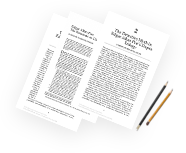Need help with my Health & Medical question – I’m studying for my class.
Think about a challenge, opportunity, event, or issue that affects your community. How might having knowledge of the social sciences affect how you understand that issue or how you act?
Discuss the responsibility (if any) of citizens to be informed about the social sciences. Consider how a population with a basic understanding of the social sciences could influence how current global challenges or questions are approached.
Expert Solution Preview
Introduction:
Having knowledge of the social sciences can play a significant role in understanding and addressing community challenges, opportunities, events, or issues. It provides individuals with a comprehensive understanding of the social dynamics, human behavior, cultural influences, and societal patterns that shape their community. In this context, we will discuss the impact of social sciences on individual understanding and action, as well as the responsibility of citizens to be informed about the social sciences.
Answer 1:
By having knowledge of the social sciences, individuals gain a deeper understanding of the multifaceted nature of community issues or events. It allows them to view these challenges from a broader perspective, considering various social, cultural, economic, and historical factors that may contribute to the problem at hand. For instance, when examining a public health issue in a community, such as the prevalence of a particular disease, knowledge of social sciences can help in identifying the underlying social determinants of health, disparities in access to healthcare, or cultural beliefs impacting treatment-seeking behavior.
Furthermore, social sciences equip individuals with analytical and critical thinking skills, enabling them to interpret and evaluate different perspectives and evidence. This understanding enables them to develop more comprehensive and effective strategies or interventions to address community issues. It encourages individuals to consider systemic and structural factors that influence these problems and to propose long-term solutions rather than superficial fixes.
Having knowledge of the social sciences can also foster empathy and cultural sensitivity, allowing individuals to navigate complex social interactions and engage with their community more effectively. It helps them appreciate the diversity of experiences, values, and beliefs present within their community, leading to more inclusive and equitable interactions.
Answer 2:
Citizens have a responsibility to be informed about the social sciences as it provides them with the tools to be active and engaged participants in society. A basic understanding of the social sciences enables individuals to critically evaluate information, understand the complexities of social issues, and make informed decisions. Informed citizens are better equipped to identify biases, misinformation, or manipulation present in social and political narratives.
Moreover, a population with a basic understanding of the social sciences can significantly influence how current global challenges or questions are approached. It can foster a more evidence-based and rational approach to decision-making, reducing the impact of personal biases or uninformed opinions. Informed citizens are more likely to engage in constructive dialogue and debate, facilitating the formulation of well-informed policies and solutions.
Additionally, knowledge of the social sciences promotes active citizenship and civic engagement. It encourages individuals to participate in community initiatives, advocate for social change, and contribute to the betterment of society. Informed citizens can play a pivotal role in shaping public opinion, influencing social norms, and driving positive societal transformations.
In conclusion, having knowledge of the social sciences empowers individuals to understand community challenges more comprehensively and act effectively to address them. It also places a responsibility on citizens to be informed, encouraging them to critically evaluate information, contribute to informed decision-making, and actively engage in shaping their communities. By fostering a population with a basic understanding of the social sciences, we can positively influence the approach towards ongoing global challenges and promote a more equitable and socially conscious society.




